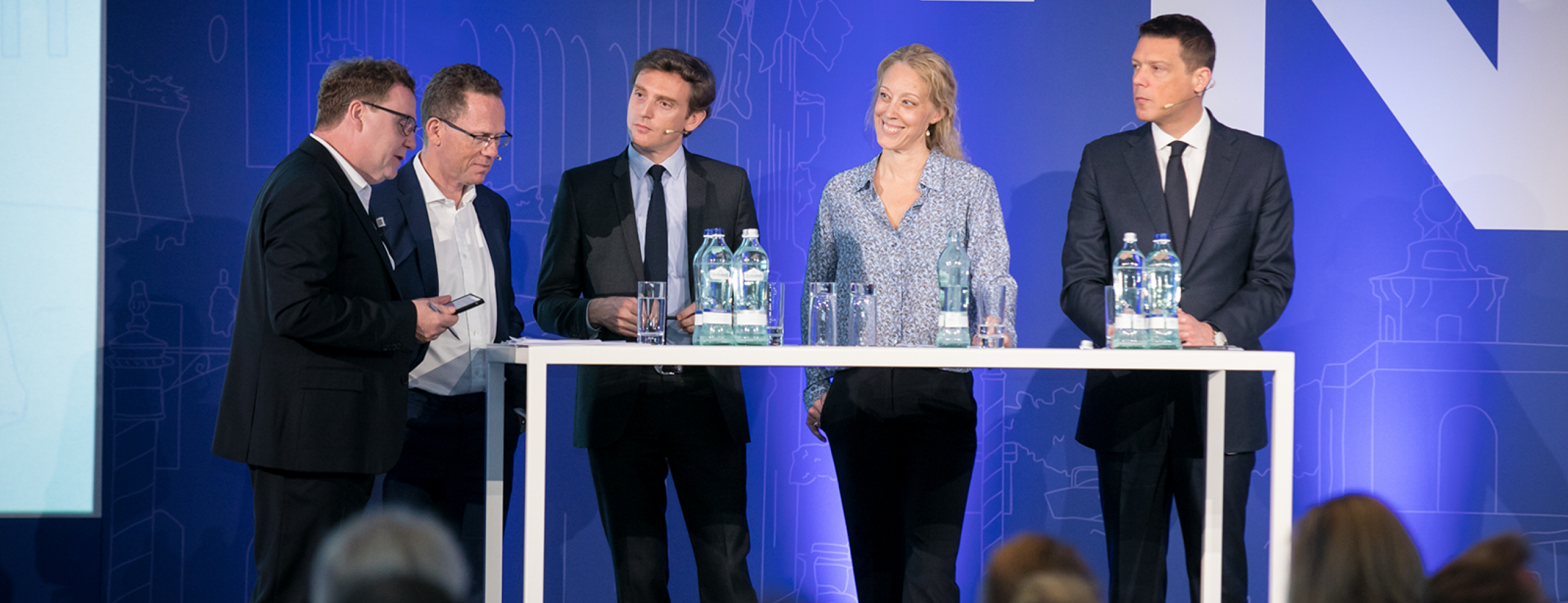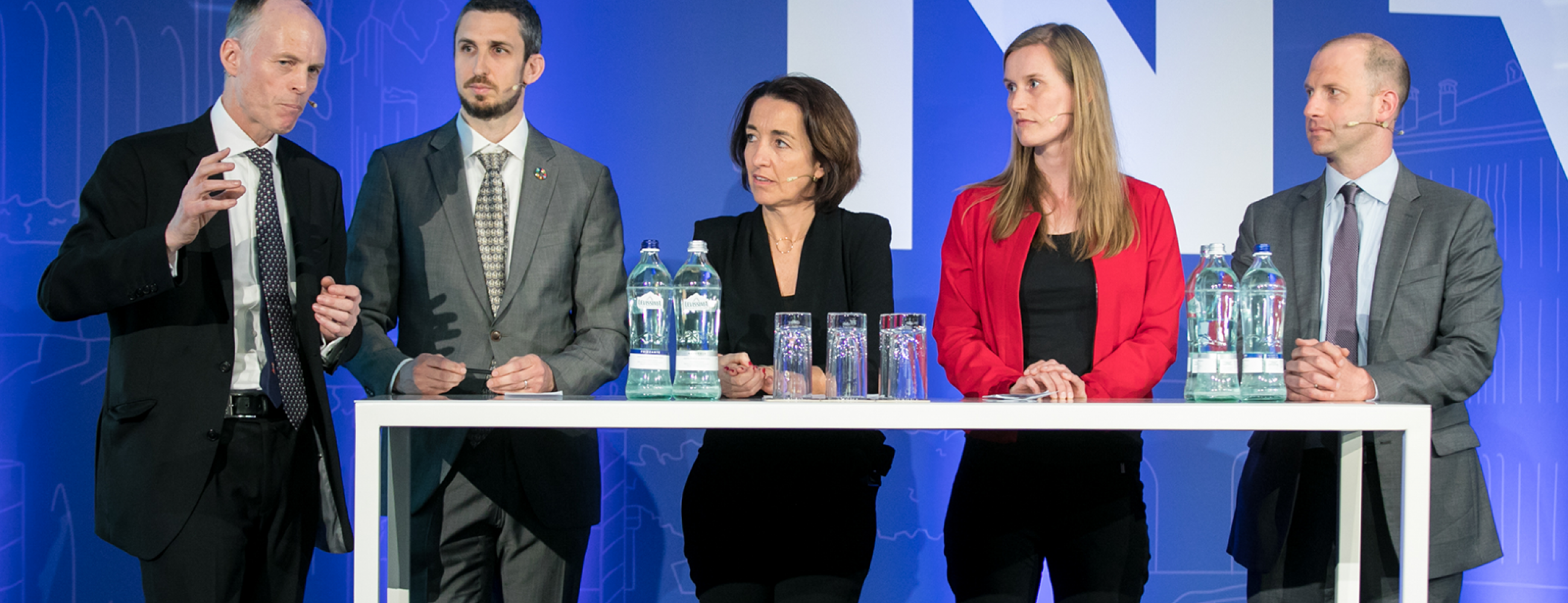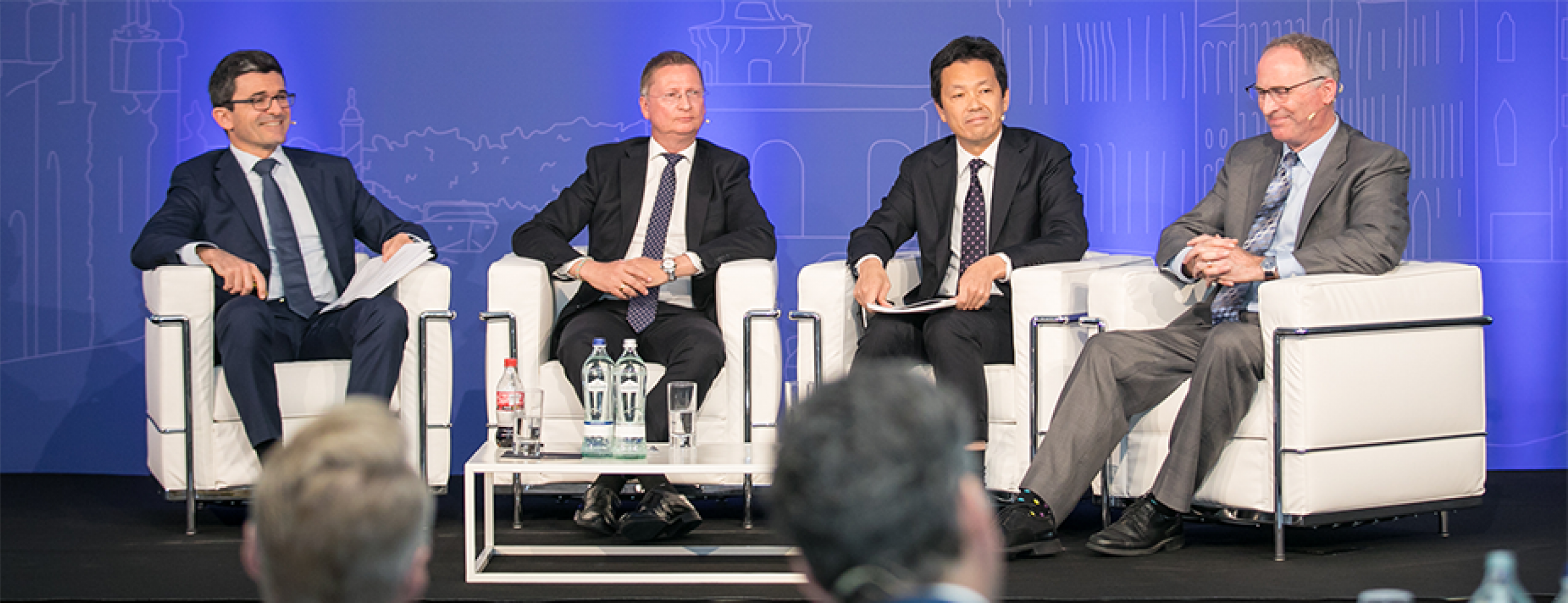INREV Annual Conference 2019 Venice: presentation summaries
Over 450 senior industry players gathered in Venice for the sought-after industry event of the year, the INREV Annual Conference 2019.
Over two days, a cautiously optimistic crowd discussed ‘How to invest in Uncertain times’, the thought provoking programme and impressive speaker line up kept everyone on the edge of their seats while they listened, learned and engaged on hot topics such as impact investment, global capital flows and digitalisation.
The programme was certainly tinged with an air of comradery with most presentations alluding to the notion of community, togetherness, solidarity and union as the key drivers of resilience. Jeroen Dijsselbloem suggested Europe should stand and work together in educating politicians on the interconnectedness of our industry. Ruud Veltenaar stressed that together we should do good whether that be on a personal or corporate level which was a great setting for the discussion that followed on the merits of impact investing, intertwining nicely with sub themes of ESG, digitalisation and globalisation, and how these are affecting or will be affected by the muddy waters that may lie ahead.
We launched the eagerly awaited Asset Level Index – a game-changer for our industry, enabling greater insights into drivers of fund performance, market comparison, new levels of granularity and improving investment decisions and significantly increasing transparency across the board.
Global outlook – making sense of uncertainty

The Conference programme started on a high note with Andrea Boltho, Director of Oxford Economics, Emeritus Fellow, Magdalen College, University of Oxford Professor who gave an upbeat and very energetic presentation on the global economic outlook, aptly setting the scene for the coming days. Taking us on a journey of the key economic events of the recent century, Boltho reminded us that not long ago the outlook was rosy with rapid growth in the US and economic recovery for China, Brazil and Russia. Fast forward a few years and the case is not quite so rosy with Italy and Germany who are in a manufacturing recession, consumer confidence is in decline and not to forget Brexit. When we ask why, we can look to economic tightening in China for a start which shows that Brexit is just a minor blip when we look at major systemic risks to the global economy. ‘Another global crash is inevitable’ stressed Boltho ‘but when I cannot be sure.’
Boltho also divulged a rather telling analogy on the debt crisis; while most European countries face record high corporate and household debt levels, Germany does not, and he explained that may be linked with connotations to the word ‘Schuld’ – the German word for Debt which also means ‘guilt’ suggesting that if other countries made the same associations, the outlook may be somewhat different.
In reference to the North/South political model, with the North typically seeking to solve problems before sharing them and the South seeking to share problems before solving, the audience were posed with the question of can the monetary union continue with such growing differences?
Boltho concluded that the EU zone is a fragile construction and tension on financial markets can re-emerge just as quickly as they disappear. The current economic slowdown is only a result of temporary factors and a moderated steady growth would reoccur with domestic trends on the rise, a good labor market and decreased unemployment, but did warn that Italy with its growing populist movement is the biggest threat to a stable Europe, fearing that its departure could trigger a domino effect, cause chaos in financial markets and ultimately dismantle Europe as we know it.
Audience poll:
Will the Eurozone still exist in 10 years’ time?
- Yes: 82%
- No: 8%
- Not sure: 10%
Audience poll:
What is the highest risk to the EU economy over the next 2 years?
- Political fragmentation within Europe: 40%
- Trade War: 8%
- Brexit: 13%
- Recessions in the US and China: 38%
Europe on tour: Which region will win your investment?

The audience were asked at the start of the session, ‘You have €1 billion to invest in real estate in a single region with a time horizon of achieving returns in 3 and 10 years. Which region do you choose?’ Over a 3 year horizon 49% of the audience were in favour of spending their cash in Western Europe, 21% in Southern Europe, 18% in the Nordics and just 12% in the UK. Over a 10 year horizon Western Europe was the first choice at 43%, followed by the UK at 33%.
An elevator style pitch presentation given by INREV members followed on representing the four European regions; Western Europe, UK, Southern Europe and the Nordics.
Representing Western Europe, Lars Huber, CEO European Region at Hines pitches his region as one with a good growth rate, low political risk and in particular, strong rental growth in the logistic market with a general consensus that the region has bounced back since the GFC.
Representing the UK, Bill Hughes expressed that the UK is very much open to investment and that the UK is much more than just London. There has been devolution and the other major cities such as Bristol and Newcastle are also showing strong growth. Hughes added that Brexit is a bump in the road and the region still poses a great opportunity for long term core investments.
Representing Southern Europe, Philippe de Martel, Head of Fund Management surprising told the audience not to invest in Southern Europe but rather invest in the sectors that are underpinned by demographic trends in the region, specifically, student housing, healthcare, logistics and data warehouses.
Representing the Nordics, Therese Rattik, CEO at AREIM pitched her region as the fifth largest economy in the EU, the third largest real estate market and the first in innovation. She highlighted the region is a safe haven of stability, predictability with plenty of investment opportunities to catch. Rattik went on to make the compelling case that with the right expertise and mindset, the office and light industrial sectors are key markets in the Nordics for investment. Therese stressed that investors should invest in cities not regions.
At the end of the session the audience voted again on which region they would invest in and in the short term there was more interest in Western and Southern Europe. In the long term there was increased interest in the UK and Southern Europe. Interest in the Nordics decreased despite the claim that ‘cold is cool’.
In good company: The merits of impact investing

A lively debate moderated by Peter Hobbs, Managing Director at bfinance discussed the merits of impact investment. Peter was joined by Maaike Hof, Senior Portfolio Manager International Real Estate and Impact Investing at MN, Nathalie Caillard, Deputy CEO, AMPERE Gestion, Reuben Teague, Vice President, Impact Investments, Prudential and John Levy, Director of Impact investing, Franklin Templeton
Maaike Hof at MN began with ‘the world has an impact on our investments, and our investments therefor have an impact on society – that’s the motto we follow’. Maaike further explained that at MN, the investments they make should for the most part improve the lives of the pension holders.
Nathalie Caillard explained the three dimensional approach at AMPERE Gestion; risk, return and impact and explained that there is no trade off between impact and returns, that is very important.
John Levy shared that asset owners at Franklin Templeton care about impact and that while everyone wants to know where their food comes from, where their clothes are made, their clients want to know the impact of their investments.
Reuben Teague advised to always search for and utilise best in practice standards for apple to apple comparison.
When asked why there are not more impact investors, answers from the panel included the lack of knowledge and expertise, a perceptual lack of measure of social impact although it was stressed that this is rapidly improving.
Moving forward the panel unanimously agreed that establishing a framework for measuring impact is crucial and a process of pass, review and assess is always a useful tool in the practice. ‘Measuring the impact is important, but equally important is managing the framework’ stressed Nathalie.
Audience poll:
Is it possible to reverse climate change through impact investing?
- Yes: 40%
- No: 37%
- Maybe: 23%
Investor Outlook: Sustaining growth in a global slowdown

A global investor panel discussed sustaining growth in a global slowdown and shared their rational for going global, how they set their investment goals and performance targets and what keeps them awake at night. Mahdi Mokrane, Head of Research and Strategy at LaSalle Investment Management was joined on stage by Mike DiRe, Director of Real Estate at CalSTRS, Rainer Komenda, Head of Real Estate Investment Global at Bayerische Versorgungskammer and Shinji Kawano, Head of Overseas Property Investment at Tokio Marine Asset Management.
All investors shared the commonality that going global offers them diversification, the internalisation of global growth and enables access to a deeper opportunity pool.
In relation to expected returns, Kawano set 2 – 3% returns on core funds and expected higher returns of 6-8% before currency return on core, open end commingled funds. From DiRe, the audience heard expected returns of 7% from value added and opportunistic outperformance strategy. When discussing hedging issues when going global, it was heard that German investors typically can’t invest in the US due to tax leakage and hedging costs but in contrast, the US will take on more risk overseas. In Japan, currency is an issue with high hedging costs for the Australian and US dollar but not for the Euro.
When discussing how the investors execute their overseas strategy, Kawano preferred industrial and residential open end funds; DiRe value added large funds but require confidence through strong relationships and a built -up trust with an experienced manager when going overseas. Komenda looks for cash flow even with redevelopment funds. All panelists agreed that joint ventures and club deals are attractive for control and critical mass whilst being able to take on more risk and gain access to deal flows.
The reasons cited that kept investors awake at night included a recession in China and US, the need to deploy capital and not have it sitting in the bank account with negative interest rates and the big question posed was are our partners ready for the downturn?
State of the union: reflections on a changing Europe

Joined by Jeroen Dijsselbloem, former Head of the Eurogroup, the audience heard how Europe has changed over the past couple of years and how it continues to evolve and reinvent. Dijsselbloem began by praising the formation of the European Union and its various institutions but was quick to criticise its lack of infrastructure and proper implementation citing its current problems as a result thereof. There was a huge misunderstanding of what it meant to be part of the European Monetary Union, you have to take the rough with the smooth – disadvantages should also be expected. Citing Winston Churchill, ‘Never let a good crisis go to waste’, the former Eurogroup Head did commend the actions taken during the crisis in that Europe took bold and brave political steps that just unfortunately lacked the correct framework and infrastructures – the Schengen was a great idea, but the correct institutions were lacking to protect the periphery borders, giving one example. If we really want to understand what is going wrong with Europe we should take a step back from the North/South analysis and look at all countries. Furthering the theme of togetherness and solidarity, Dijsselbloem suggested Europe needs to continue to take steps to strengthen the union proposing a common EU budget and the creation of a banking and fiscal union, and while we did not waste the crisis, we could be wasting the good times.
In working together for a better Europe, Dijsselbloem concluded that Eurozone countries still need to address domestic economic issues such as banking, that Europe needs to rely less on banks and more on capital markets and that Europe needs to develop itself further politically and speak globally with a unified voice especially on issues such a migration. The keynote was rounded off with an optimistic note with hopes that a new commission will take better measures supported by the still very large mandate of European voters who still champion and strive for a better Europe. We can have more confidence and optimism in the future of Europe and we are in fact making progress as a superpower in economic terms, but the time has come to become a political super power but for this we need multilateral cooperation. Only pessimists believe we are close to the abyss – there is no time for fear, it is time to take steps.
Audience poll:
Which is the biggest challenge to the EU over the next 2 years?
- Internal Economic Issues: 19%
- External Economic Issues: 12%
- Internal Political Issues: 61%
- External Political Issues: 8%
Drivers of fund / vehicle performance: Launch of the Asset Level Index

Marking three years of hard work and dedication, the much-awaited Asset Level Index was officially launched to the non-listed real estate industry.
The audience listened as Nick Blakemore and Guido Verhoef, two of the projects founding members who enthusiastically made the case for greater transparency, deeper data granularity, new levels of market comparison and understanding of the drivers of fund performance, citing the latest addition to the INREV suite of indices as a game changer for the industry.
Developed in response to an industry wide call with over 7000 assets covering 20 countries, the size of the index on launch day was already at €150 billion far exceeding the €100 billion target.
Urging more INREV members to come together and sign up to the index, enabling its greater reach and size, ‘Together we can achieve more, let’s join together and build the index’, proclaimed the duo.
Apartment Living: Interview with Bob Faith

The second day kicked off with a live interview with Bob Faith, Founder and CEO at Greystar, interviewed by Andrea Carpenter, Director at Women Talk Real Estate.
Sharing his story to date, the audience heard how Faith founded Greystar in 1993 from humble beginnings at just 30 years old with a vision to perfect multi family housing as an asset class for institutional investors.
Fast forward a couple of years to 2012 when the company had comfortably succeeded in the US market and attracted by global opportunity and the influx of global capital into the US market, Faith branched out into the international playing field. ‘I always talk about the 6 pillars of excellence at Greystar and one of those is growth – retaining talent and giving people the opportunities to move up are important for the organisation so it felt like the next step.’ Shared Faith.
Venturing into Europe provided opportunity as there were no blue chip institutional operators at that time, multi-family was not considered an institutional asset class.
This is changing, Faith believes the market in Europe is without question institutionalising but the issue is scale. Discussing the barriers to greater institutionalisation, Faith cited regulation as a potential bump in the road and the need to bring government organisations on the same page by communicating the ways in which purpose built planning differs from to-buy housing, for example. When asked about the European experience, Faith told how Greystar was prepared for the challenges in Europe but overall, very pleased with the results.
On the topic of diversity, 75% of the leadership in the UK are women and for the US, that figure is somewhat of a work in progress but Greystar has many programmes designed to improve this.
Sharing practical steps to ensure a more diverse workforce, he explained ‘Focus, Measure, Talk and Promote’ In testament to the diversity efforts at Greystar, Carpenter remarked that Faith was the first male she had met from the company.
Touching on the hot topic of impact investing, Faith made the case that while Greystar does not have a defined strategy in place, it has its own ways of creating impacts via the supply of rental housing to tenants who would otherwise not be able to live in certain areas. On the future, Grey spoke of the continued focus on rental housing, continued growth in Europe with sights set on Asia-Pacific but noted that relationship building is key to success.
Inside information: How to arm your company for digitalisation?

With the industry abuzz with talk of the data revolution, a debate on preparing for digitalisation moderated by Richard Bloxam, Global CEO, Capital Markets at JLL and joined by Lucy Fletcher, Managing Director, International Portfolio Management, QuadReal Property Group, Thomas Schneider, Managing Director and Founder at Brickvest and Mike Sales, CEO, Nuveen Real Estate was a very on topic addition to the second day of the Annual Conference.
On the broader theme of ensuring business continuity in the face of an ever-evolving landscape, Bloxam declared that everyone has a responsibility to think forward, ensuring business is resilient and that technology is only going to accelerate the pace of change so we should arm ourselves for that.
It was noted that all businesses are now digital, no matter the context but what remains a question is exactly what can be automated or disrupted and what will remain at the control of the human element. Success will increasingly depend on the ability to seamlessly fuse physical, digital and biological worlds with the human experience remaining as the critical ingredient, leading to a new wave of tech-driven consumer focus and analytics. The audience were asked if they thought their own jobs would be automated to which surprisingly just half of the room agreed and in response, Bloxam added that it not the job that is taken over but rather elements within the role that can be automated thus enabling humans to focus more on creating value and that the adoption of technology is actually as much about people and how you engage with your team and change their ways of working as it is about the technology itself.
Providing practical tips, Sales added that it is also important to arm your company with the correct skillsets, to be able to drill down to the nitty gritty by using a data scientist for example. Only once the skillsets are in place can you begin to explore automation, big data and ultimately help to make better informed investment decisions. From the BrickVest perspective, Schneider explained that he does not view his organisation as a disruptor but rather an enabler, in making the industry better and more efficient. When considering the practicalities of technology in organisations, Fletcher added that it is important to ensure that technology really makes sense and is well connected in enabling seamless sharing of data for example and advises to always look at the processes that are involved in technology adoption.
Prof. Linda Gratton. – Author of ‘The 100 year life.’

‘A year has now become 14 months and a week is now 8 days’ proclaimed Prof. Linda Gratton, Author of the 100 Year Life.
In every country in the world (with a few exceptions), people are living longer but birth rates are decreasing and Japan is especially on the receiving end of this trend. Whilst we are living longer, we are also more healthier than ever before, dispelling any connotations of an old and decrepit society. With this in mind, the notion of age is malleable and Gratton proposed that 65 is the new 45. We always refer to age in line with the number of years since birth, but we can also look at our DNA age or mortality age as another indicator.
Thinking of the effects of our extended lives on retirement, we currently have three options; work more, save more or work longer based on the current three-stage sequential model of education, work and retirement but Gratton proposed an alternative; we’re living longer so why not hash up the traditional model? Why not educate ourselves throughout the entirety of our lives? why not take a piece of retirement in our twenties? And why not indulge in different styles of work? Those are the actions that are crucial to the 100 year life.
Photo gallery
In the press
Find out what the press have been saying about the INREV Annual Conference 2019.
‘INREV has launched its anticipated asset-level index and announced the creation of an index to track open-ended core funds.’
IPE Real Assets
‘Europe growing more attractive for Japanese property capital, INREV meeting hears’
Business Immo
‘(INREV) says the new Asset Level Index responds to an industry-wide demand for independently-managed asset information.’
Commerical Property Hub
‘Optimisme overheerst op INREV jaarcongres’
Vastgoedmarkt
Save the date 2020

Mark your agendas. The Annual Conference 2020 will be held in Athens on 22-23 April 2020.